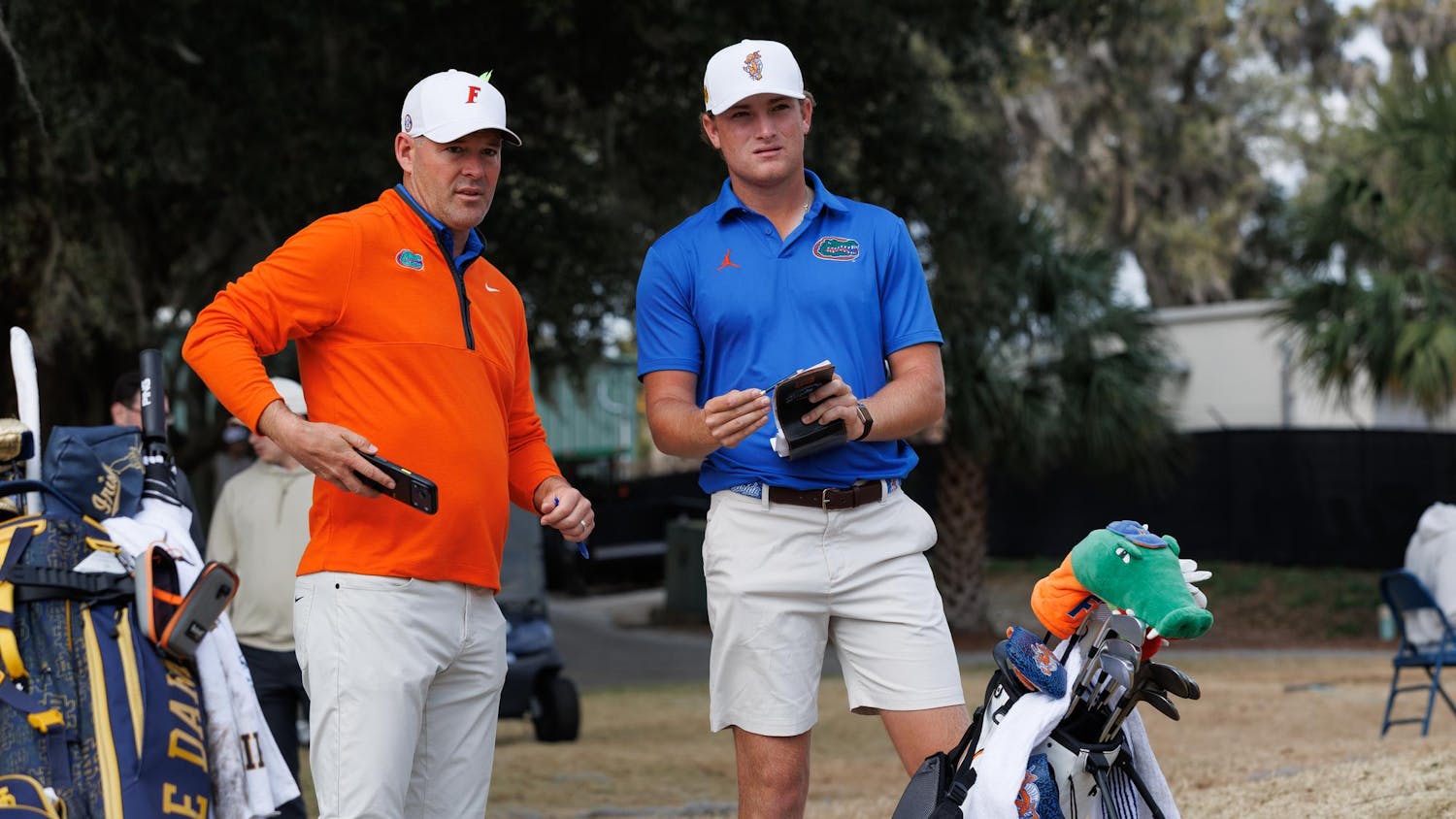The shift from college to the professional world is one of the most crucial transitions for any individual in any walk of life.
This process is magnified for athletes, who go to sleep one night scraping by like any other college student and wake up the next morning with a contract or signing bonus worth six or seven figures.
For golfers, the transition from college to the pro ranks is less publicized than in any other sport, but it is no less meaningful for a youngster hoping to try his hand on the PGA Tour.
After the NCAA Championships in June, Florida seniors Andres Echavarria and Bank Vongvanij will begin their journeys into professional golf.
Echavarria, the No. 24 golfer in the NCAA, came to UF five years ago from Medellin, Columbia, and has since emerged as one of the brightest professional prospects in the nation.
Along with his Southeastern Conference Tournament title last weekend, Echavarria won individual honors at the Gator Invitational in February.
Vongvanij entered the 2010-2011 season as somewhat of an unproven commodity. In his junior campaign, he earned five top 10 finishes despite inconsistent play all year.
One year later, Vongvanij has taken the NCAA by storm with three victories and five top 10 finishes, peaking at No. 2 in February before settling into the No. 5 slot.
But when the two Florida stars’ prolific collegiate careers come to an end, they will find themselves just like every other golfer: looking for any way into the pros.
What makes the process of breaking in as a professional golfer so different from most other sports is that there is not one set-in-stone way to do it. There are numerous different paths a golfer can take toward playing full time on the PGA Tour.
A golfer who excels in the collegiate ranks will often receive a sponsor’s exemption into a professional event, most often in the Nationwide Tour, a de facto minor league for the PGA Tour.
By doing well in the Nationwide Tour, a golfer can earn a PGA Tour card, and with it, the opportunity to play in more prestigious events with larger prize pools.
Anyone who finishes the season in the top 25 of the Nationwide Tour money list, or wins three tournaments in one season, automatically receives a PGA Tour card.
Echavarria has already used the Nationwide Tour as a vehicle to make a name for himself in professional golf.
This spring, Florida coach Buddy Alexander allowed Echavarria to play two Nationwide Tour events. The senior made his pro debut at the Pacific Rubiales Bogota Open in his native Columbia and tied for 19th.
His top 20 finish earned him a spot in the Chitimacha Louisiana Open, one of the more prestigious stops on the Nationwide Tour.
There, he played what he called the best rounds of golf of his life, finishing in second place to Tour veteran Brett Wetterich, who represented the U.S. in the Ryder Cup in 2006.
The Nationwide Tour experience was crucial for Echavarria, as his results earned him exemptions into other events later this year.
“I’m going to try to play as many of those events as I can,” Echavarria said. “If I continue to play well, more exemptions will come, and I can come closer to becoming a full-time player.”
Because of the sheer multitude of paths a golfer can take to the pro tour, Echavarria admitted that the process can be daunting.
But at Florida, Echavarria said he was fortunate to learn from a good network of alumni who tried their hand at professional golf, including PGA star Camilo Villegas.
Another benefit of playing the Chitimacha Louisiana Open in March was having the chance to talk to established professionals and benefit from their experiences.
“I like to talk to people and hear their stories,” Echavarria said. “Every guy comes through the system in a different way, and I learned a lot from what they told me.”
The most common way for a golfer to break into the highest ranks of professional golf is the PGA Tour Qualifying School.
But Q-School, as it is more commonly known, is not an easy road.
Considered one of the most mentally grueling processes in all of sports, Q-School consists of four stages. Each is a set of four-round golf tournaments, except for the final step, a six-round marathon.
Each event is played in its own month, with the first beginning in September and the final tournament concluding in December.
Echavarria said he is trying to avoid going to Q-School because he hopes to have his career off the ground by then, avoiding the stress and difficulty of the four-month process.
The top 20 to 30 golfers advance from each tournament, moving ever closer to their dream of playing on the PGA Tour.
The final stage of Q-School is truly one of the unique events in all of sports.
The fourth stage of Q-School in 2009 exemplified the striking diversity of the field.
Former PGA Tour champion Joe Ogilvie, 22-year-old Rickie Fowler and 35-year-old journeyman Michael Connell all earned their Tour cards.
“Being here, finishing No. 132 on the money list, is humbling,” Ogilvie said. “But having done this the last six days and being here for 10 days ... Shakespeare would have written one hell of a tragedy. It is one hell of a tournament. It is an amazing thing that we don’t sell it a lot better because it is one hell of a deal.”
The top 25 finishers in the six-round final of Q-School earn a Tour card, while the next 50 players earn Nationwide Tour cards.
Having players move on to the pros is nothing new for Alexander, whose son, Tyson, turned pro after graduating from UF last year.
“My job as coach is to field the best possible team for the university and to prepare them for life after college,” Alexander said. “I do take pride in the fact that we have so many kids come through here go on to play professional golf.”
When asked why he thought Echavarria and Vongvanij will become successful pros, Alexander was quick to tout both of his standouts, albeit for different reasons.
“Bank is a terrific competitor who just won’t be denied, and he has a work ethic beyond what I’ve seen from any other player I have coached,” Alexander said. “Andres is a hard worker, but he is just flat-out talented.”
Vongvanij has yet to play a professional event, but his collegiate track record suggests he has a shot at reaching the PGA Tour.
The transition from collegiate to professional golf is an arduous process that is not understood by the average golf fan.
But there is one thing that rings true: Regardless of the path a golfer chooses to take to PGA Tour success, the cream of golf talent almost always rises to the top.
“It all comes down to how hard you work and how mentally strong you are on the course,” Echavarria said. “I’m confident I can make it because I think I have what it takes to succeed in those areas.”






